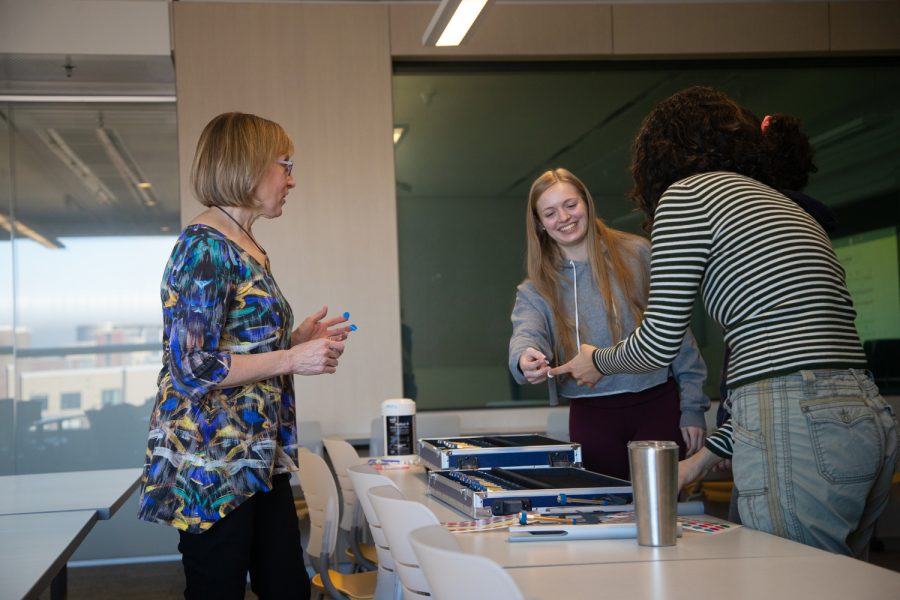University of Iowa music therapists highlight growing profession
From Feb. 26 to March 4, music therapists across the state and university are honoring their profession, which is seeing significant increases in popularity.
Music therapy professor, Kristen Nelson, teaches students at Voxman Music Building on Feb. 28, 2023. Nelson is teaching her students how to musically conduct people in assisted living, preschool, and more.
February 28, 2023
Kelly Carlson knows how music can change people’s lives.
Carlson, a visiting professor and doctoral student at the University of Iowa studying musical therapy, has worked as a music therapist for 18 years.
“I get the chills on a weekly basis just seeing how music touches people,” Carlson said. Carlson is also the vice president of the Midwestern Region of the American Music Therapy Association.
Carlson said she works mostly in hospice where she provides patients with music therapy to help them feel relaxed and at peace.
“Somebody who might be really stressed and anxious — maybe has dementia and maybe doesn’t know where they’re at or who anybody is — but they will still sing complete songs with me and dance and smile and just light up,” Carlson said. “That’s priceless to me.”
Music therapists at the UI are celebrating their growing profession during national Music Therapy Week, which is from Feb. 26 to March 4.
Music therapy is the use of music to help patients by lowering stress, reducing pain perception, and improving patients’ moods through self-expression. Music therapists develop music-based treatment programs where participants listen to music, sing, play instruments, and compose their own songs.
According to the American Music Therapy Association, the demand for music therapy in the U.S. has doubled in the last five years. Additionally, the Music Therapy Market has seen increased popularity as an effective physiological treatment.
Kirsten Nelson, a UI instructional professor and coordinator of clinical activities in music therapy, said she has seen the profession grow.
“Music therapy is an evidence-based profession that’s growing in its ability to serve and the willingness of people to engage in music therapy in their communities,” Nelson said.
Aside from teaching at the university, Nelson has been a clinician in music therapy for 18 years.
“I love the way music brings people together, and I really love the way music creates connection between people,” she said.
Nelson said she was able to celebrate this week with a number of music therapists in Iowa City.
“We had a gathering yesterday of music therapists because we are all from different places,” she said. “We’re just very fortunate to have 20-plus certified music therapists in this area.”
UI first-year music therapy student Laura Kuper is also getting involved with the festivities. Kuper wrote in an email to The Daily Iowan that she decided to study music therapy to combine her love of music with helping others.
“I saw how music can cause miracles to happen,” Kuper wrote. “For example, I played a song for people with moderate-severe dementia, and they could remember the lyrics, though they could not remember their own birthday.”
RELATED: DITV: Music Therapy at the UI Hospitals and Clinics
For her first year of Music Therapy Week as a future therapist, Kuper wrote she will find time to appreciate the profession.
“I will take more pride in my work, and I will give my professors (who are amazing music therapists) an extra ‘thank you’ for all they do,” she wrote.
Carlson said she hopes to make an effort in speaking out about her profession.
“During Music Therapy Week, I tend to go out of my way to do more advocacy for music therapy,” she said.
Carlson said she wants to stress the effectiveness of music for non-musical things like social coping skills, relaxation, pain management, and even rehab from traumatic brain injuries.
“It’s just something that people don’t typically think of right off the bat, but it is a proven and evidence-based profession that can provide a lot of good for a lot of people,” she said.














